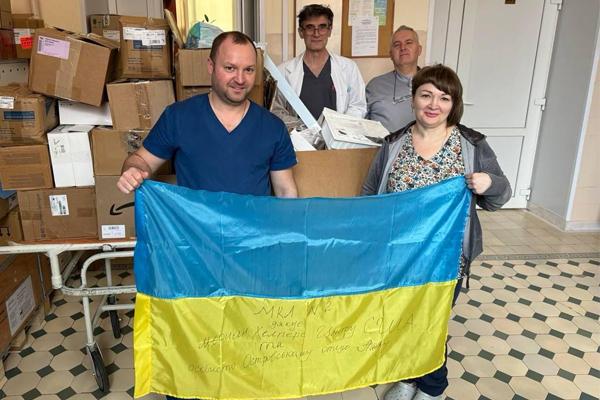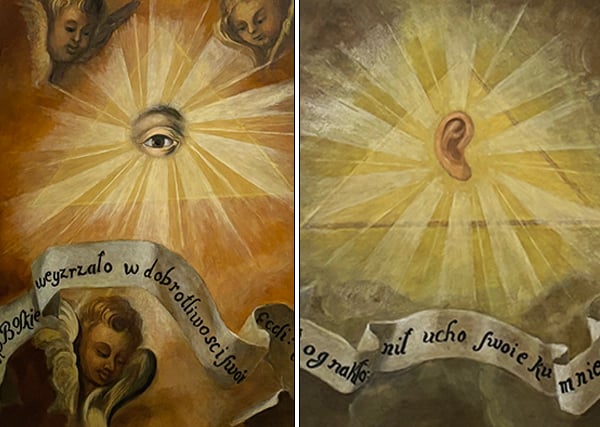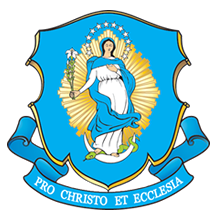
"I want to say thank you from the bottom of my heart. I am very thankful to our Marian Fathers Congregation, the Polish province and the American province, and our very generous donors. They understand the need very well. They understand that we are walking together along the road to victory."
HOW TO HELP!
Please visit Marian.org/Ukraine to make a donation for Ukraine relief. One-hundred percent of funds received are sent directly to Ukraine and used to purchase humanitarian aid and medical supplies.
Please do not mail medical supplies to Ukraine! Instead, please contact the Eucharistic Apostles of The Divine Mercy: 1-877-380-0727 or e-mail [email protected] to answer any of your questions.
Because shipping via container is more cost effective, we prefer whatever monetary donations you can give rather than you sending medical supplies. Please know that boxes previously sent to the Marians or the EADM office were sent to Project C.U.R.E. and will be on future containers.
Previous articles on Ukraine.
“We are walking together on the road to victory”
By Dr. Joe McAleer
Father Pawel Ostrovski, MIC, is the superior of the Ukrainian vicariate for the Marian Fathers Congregation, overseeing 16 priests across the country and one seminarian. Since the war began in 2022, he has also been serving full-time as a chaplain in the Ukrainian army, visiting troops along the front lines in the East.
Born in Khmelnyckyj, a city in western Ukraine, Fr. Pawel, 56, entered the Marians in 1990 and was ordained to the priesthood four years later.
He sat down with Marian Helper and shared his experiences as a chaplain, as the war extends into its third year.
You’ve been a priest for 20 years. Did anything in your past prepare you for your role today as a wartime chaplain?
When I was in our Marian seminary in Lublin, Poland, I first learned about priests who served as military chaplains. After all, our Founder, St. Stanislaus Papczyński, was one. I desired to be one of them. But this was the time of the Soviet Union, and I understood this was just not possible.
In 2014 when the war with Russia began in the East, I was called to a military unit and told I was conscripted into the army, because I had the appropriate military education. Before I went to the seminary I served in the army in Afghanistan. “Well, if I need to go, I’ll go,” I said.
And then they asked me, “What’s your job now?” I said I was a priest. And then they said, “Okay, thank you,” because they know what to do with me.
“I can be a chaplain,” I offered. But there were no army regulations covering chaplains.
When the present war started in 2022, our bishop called to say that the government passed a bill introducing the ministry of the army military chaplain. The bill gave 11 places for Roman Catholic priests. I said, “I cannot give you anybody, but I can go myself.”
What are your duties as chaplain?
I’m with the soldiers all the time, in the East. I am based in one place with the commanders of the unit, and visit the smaller units in various places directly on the front lines. I am not allowed to go to the “zero-line,” where there is direct contact with the enemy. But there is often shooting, and sometimes I have to escape and hide. That’s why chaplains are accompanied by security guards.
Every Sunday I offer a Mass. We arrange a chapel somewhere in a cellar, using my equipment, which is portable. We make an announcement and say that at this place there is a “center for psychological and spiritual hope.” And the boys come, maybe 12-17 at a time. If we manage to get the commander of the unit to Mass, then double the amount of people come. I also hear Confessions.
I saw a little girl talking to an officer, and she called him “Father.” And he called her “my angel.” I asked if they were related. And this officer said, “No. She’s not my daughter, but I’m taking care of her.” And he added, “My own child is serving somewhere. And I hope somebody will take care of him as I am of this little girl.”
You have said that “God is always present” along the front lines.
He is. God is here. Let me share two stories.
I saw a little girl talking to an officer, and she called him “Father.” And he called her “my angel.” I asked if they were related. And this officer said, “No. She’s not my daughter, but I’m taking care of her.” And he added, “My own child is serving somewhere. And I hope somebody will take care of him as I am of this little girl.”
At another position, I saw another girl, about 4 years old. She was nicely dressed, holding a small basket with apples, giving them to the soldiers. One of the soldiers said, “This is our angel.” And they gave her a package of some sweets. There was a beautiful exchange. And he said, “This is the only family that stayed here in the village. Well, then, this is our angel.”

What do you say to the soldier? How do you give him hope?
It’s very important that the chaplain is among them. The presence of a chaplain makes burning questions disappear, like “Where is God?” “Does God love us?” “Why does God allow that?” When they see that the chaplain is present, it just silences those doubts.
I work closely with a group on Combat Stress Control. There are some psychologists, a medical doctor, and a chaplain. We visit the unit, which is in hiding, and over coffee and tea, conversation takes place straight away.
I try when possible to speak to the soldiers about the history of the Marian Fathers, about St. Stanislaus and his experience as a military chaplain. And I often show the soldiers the image we Marians have in Gora Kalwaria, where on one side there is an Eye of Divine Providence, and on the other side the Ear of Divine Providence. Sometimes soldiers sometimes want to do something that is not right. And I show the image, and remind them that God is always watching.
The same goes for language. Soldiers curse quite a lot. And I remind them that God is always listening.
Sometimes, I’ll approach a group of soldiers standing around, and one will shout, “Attention! We are in Church!”
It’s very important that the chaplain is among them. The presence of a chaplain makes burning questions disappear, like “Where is God?” “Does God love us?” “Why does God allow that?” When they see that the chaplain is present, it just silences those doubts.
How is morale these days?
At the beginning of the war, for the first three or four days, people were in despair. It was extremely upsetting. But then help started to arrive from the Marians, in Poland and the United States – very specific, substantial help. We understood that God is here in our community, and our apostolate around the world.
My commander said, “Okay, you are an influential person.” And I said, “Well, God is my influence.”
Your help gets to the soldiers. They see it; they understand that this comes from the Marian Fathers and many, many generous donors. And this encourages them.
But conditions are still very difficult without electricity and water. The soldiers are young and, in most cases, not used to taking care of themselves. But the boys are well-prepared, and if they have had good training, morale is good.
They are motivated. They want to fight. They don’t wait for the state to help fix things. For example, they use their own private money, collecting money among themselves, to buy parts to repair a vehicle. They could wait, but that would postpone everything. They need it now. It’s about perseverance.
A soldier needs to do the soldier’s duty. I tell the men in my unit, “We are going the way of history, of victory. We need to do our duty.”
What’s the most common question you are asked?
People ask me all the time, “When is the war going to end?” When I have a meeting with the commander of the unit, he will ask, “Are you praying?” meaning, “When will the war end?”
“Yes, I am praying,” I say, “but the answer will come later,” and I point to Heaven.
I tell the soldiers, “Every war must have its end. And it will come faster if we understand that we are fighting together as a community, as one unit.”
This is a difficult time for us. This is real life. Russia today is total evil, and this evil is strong. And this evil is aimed not only at Ukraine but a much broader space. And if we all together, the community of the world, with the Ukrainian army, do our duty, then the war will end.
I want to say thank you from the bottom of my heart. I am very thankful to our Marian Fathers Congregation, the Polish province and the American province, and our very generous donors. They understand the need very well. They understand that we are walking together along the road to victory.
Please visit Marian.org/Ukraine to make a donation for Ukraine relief. One-hundred percent of funds received are sent directly to Ukraine and used to purchase humanitarian aid and medical supplies.
{shopmercy-ad}
















